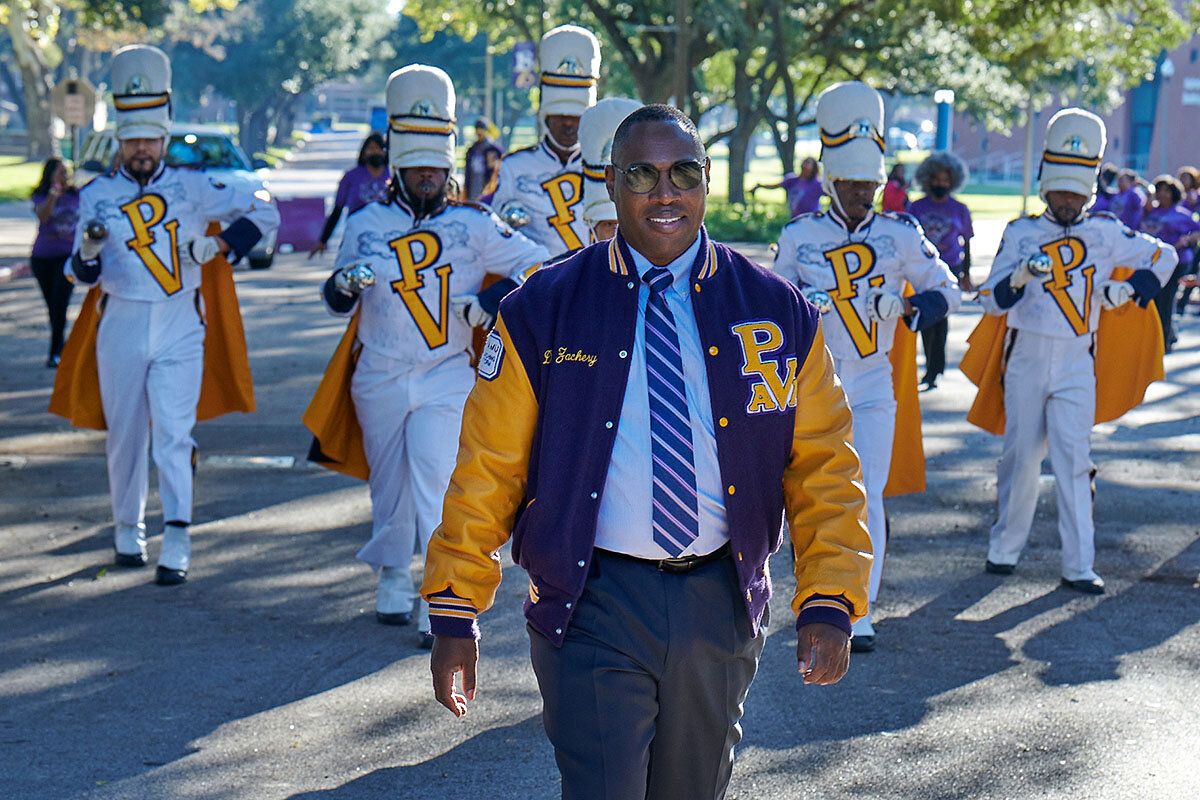‘March’: Energetic series showcases band culture – and community
Loading...
“March,” one of the CW’s newest shows, chronicles college students at Prairie View A&M University whose passion for music shapes how they navigate their lives. Viewers are privy to an up-close look at what it takes to participate in one of the top marching bands at a historically Black university.
We have had glimpses into this culture before, with movies like “Drumline” (2002) and “Stomp the Yard” (2007) bringing fictional versions to mainstream audiences. And for her 2018 Coachella performance, Beyoncé – the first Black woman to headline the festival – paid homage to the uniqueness of HBCU culture by having a full marching band and majorette dancers onstage with her.
“March” (TV-PG), with its classic reality show format, paints a fuller picture of the complexities of being a part of such a competitive and high-energy activity. The series also offers a window on the college experience, including the demographics of today’s students and how they are coping and supporting each other after months of pandemic disruptions.
Why We Wrote This
Joining supportive groups in college can be crucial to making it to graduation. Docuseries “March” explores how being a band member at a historically Black university challenges and uplifts students.
In addition to the band’s sweaty, late-night rehearsals – showcasing the drive and determination of the team’s 300-plus members who go by the name The Marching Storm – we also observe the group confronting the struggles of adolescence together. The director of bands at the Prairie View, Texas, school, Dr. Tim Zachery, is a cornerstone of wisdom the students go to in times of confusion, sadness, and concern. Drum majors Aaron and Jalen, along with Kaylan, captain of the Black Foxes dance team, are among the experienced leaders who guide the younger members.
There is plenty of talk about becoming the No. 1 HBCU marching band in the nation. (A recent low ranking from ESPN’s website “The Undefeated” leaves a sour taste in everyone’s mouth.) But we also see how these young Black and Latino folks are coming into their own.
There’s Cardavian, a nonbinary euphonium player and entrepreneur who specializes in culinary treats and also sells hair, lashes, and durags. (“You should call me what I look like,” she says in an on-camera interview, referring to pronouns.) Not only is she charismatic, but she also brings a specific social issue to the forefront of the show.
Cardavian is convinced her friends are using her for home-cooked meals when it’s convenient, then ignoring her when it’s not. She is certain that gender plays a significant role in this dynamic – we see Cardavian dressed as both male and female in various photos. And she reveals that there was a bit of drama in The Marching Storm that led to her being dismissed from the group. Cardavian confides in a friend about wanting to be back in the band – and ultimately her community. Hopefully, we will see how this pans out as the season progresses. (Only the first episode was available for review.)
Then there is the story of Tre, a bass drummer who is working hard to balance fatherhood with an academic schedule. Despite the difficulty he has acclimating to this new lifestyle, he remains adamant about being a good father to his daughter, since he didn’t have a dad growing up. Breaking generational patterns in Black families is not easy, but Tre feels confident he can do so with the support of his peers. His good friend Martayvia, who plays piccolo, has become a sister figure to him, despite some initial tension. Not only does she serve as a shoulder to cry on, but she also offers to help take care of his child whenever he needs her to. It’s one of the most touching moments of the debut episode, the first of eight.
Nehemiah, a mellophone player and aspiring leader, offers another of the show’s strong personalities. His inherent intensity makes him both a creative force and a natural antagonist. Drum major Jalen offers him tips for motivating his peers. Will he adapt?
The fact that this cultural ritual of music and dance bonds these groups of people, who come from various backgrounds and upbringings, really drives home the importance of community. Excellence on the field may be the team’s goal, but what makes members of The Marching Storm winners already is their innate ability to be there for one another.
“March” airs Mondays on the CW starting Jan. 24. The program moves to Sundays on Feb. 27. Check local listings for times.






